
Board for children $8.00 per week 1874
Homepage A to Z Index Book outline People Places Plays About these letters About EJ Phillips Chronology EJ Phillips Facebook Fan Page
On the road with Ben DeBar and Lawrence Barrett to the Chestnut Street Theater, Philadelphia
previous letter: Cincinnati
St Louis Ben DeBar and Charles Pope Lawrence Barrett Chestnut St. Theater Charlotte Cushman St Louis1894
We are still piecing together a chronology of the years prior to 1886, from the New York Clipper, other newspaper accounts (particularly play reviews), clues in the letters, and other research. After Pike's Opera House burned in March 1866 EJ Phillips was hired at Wood's Theatre by September , but seems to have moved to Indianapolis and Stock Company 2 and 3 in Sept 1867. Once she started traveling the children boarded in Indianapolis and at some points with the Zavistowskis in Suffern NY. A History of Orange County 1908https://books.google.com/books?id=IkVOAQAAMAAJ&dq=nickinson+%22New+york%22&source=gbs_navlinks_s notes that Albert Nickinson was educated in the public schools of Indianapolis, Suffern NY and Philadelphia.
Notebook recording family expenses 1874 - 1877
Board for children $8.00 per week 1874
Edwin Forrest
The seasons of 67-68, 68-69 I was engaged in Indianapolis. March 68 I played for
the first time with Edwin Forrest [1806-1872] and did not find him as difficult
to please as I had heard – on the contrary he was kind and complimentary – I
played Emelia in “Othello”, “Goneril” in “King Lear” and “Servia” in “Virginius”
with him.
John Nickinson performed in 1841 Jack Cade with Edwin Forrest at the Park Theatre NY https://en.wikipedia.org/wiki/Edwin_Forrest 1806-1872 We have a review from an unidentified newspaper of a performance at the Metropolitan Theatre of his performance in Othello where "Miss Phillips' Emelia was hardly inferior, if at all, to Iago and her last scene was striking.
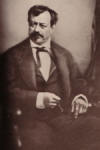 Edwin
Forrest, Strang's Players and Plays, 1902
Edwin
Forrest, Strang's Players and Plays, 1902
Strang writes "even now, more than a quarter century after his death, his precise niche in the \hall of fame is by no means determined. As a matter of fact, there were two Edwin Forrests, -- one a man of scholarly tastes, intellectual dignity, moral refinement and strength, the other a man unbearably rude, intolerably selfish, harsh toward his fellows, a creature of uncivilised bluntness, and of untempered brutality.
Lawrence Barrett, Life of Forrest and said Forrest's greatest Shakespearian parts were Lear, Othello, and Coriolanus. Edwin Forrest, Wikipedia http://en.wikipedia.org/wiki/Edwin_Forrest
In August 1868 the New York Clipper reported WH Leake secured EJ Phillips as first old woman for the newly opened Indianapolis Academy of Music. (In 1870 Leake and James Dickson also leased the Metropolitan and the Terre Haute Opera House. Indianapolis A Historical and Statistical Sketch 1870https://books.google.com/books?id=5BsVAAAAYAAJ&dq=WH+Leake+indianapolis&source=gbs_navlinks_s )
The children seem to have lived with EJ Phillips during these years and seem to have known the Fays with whom they boarded when EJP went to New Orleans.
New Orleans, WR Floyd and Charles Pope
My next engagement was at the “Varieties Theatre” in New Orleans which commenced
in Octr 1869-1870.
1871 Engaged by Chas Pope for the St. Louis “Olympic theatre”. This management
having theatres in Memphis Tenn., New Orleans, and Mobile. The company was sent
several times during the season to support “stars” in those cities. In Sept 1869 she
was engaged by WR Floyd of the Varieties Theatre in New Orleans according to her
account book.
1871 January she joined Marston and Stowe's Dramatic Troupe, touring in New England through the end of May according to her account books.
EW [Eugene William] Marston (born 1836) actor manager
August 1871 she was in Indianapolis again, and in September engaged by Charles Pope's Olympic Theatre in St. Louis, touring in Memphis, New Orleans and Mobile. In Jan 1872 she was in St. Louis and noted her second and third years with Charles Pope, mostly in the South and St. Louis.
1871 Engaged by Chas Pope for the St. Louis “Olympic theatre”. This management having theatres in Memphis Tenn., New Orleans, and Mobile. The company was sent several times during the season to support “stars” in those cities. [Palmer autobiography]
Sept 1873 I returned again to the “Olympic theatre” St Louis when Mr. Pope was still manager reporting with the company on trips to the Southern cities in the spring beginning and traveling with Mr. Barrett until July and again engaged with him for the season of 1874-75 which was spent traveling through the United States and Canada. Palmer autobiography 1890
New York Clipper 1869 25 Sept IN OUR LAST ISSUE appeared only a portion of the company engaged by W. R. Floyd for the season at the Varieties Theatre , New Orleans. We now present a complete list of the same : Mrs. Kate Meek, leading lady; Mrs. T. S. Cline, Mrs. E. J. Phillips. Fanny Stocqueier, Florence Stanley, Annie Vaughn, Mrs. C. Jamison, Mrs. R. Maddern. Annie Tyson, Kate Tyson, Maggie Rowe, Oliver B. Doud, Adam Everly, Waller Lennox, J. B. Fuller, C. H. Morton, J. R. Kay, C. H. Thompson. T. S. Cline, Wm. F. Owen, J Gobay, R. J. Browne, E. A. Aitkens, G. Sherman , W. R. Floyd; J. B. Wright, assistant stage manager; R Madden, leader of orchestra; W. C. Steelman, master carpenter; T. Macartby, property man; John H. Connlff, treasurer.
Some of the most detailed information comes from two small account books dated Sept 1867 through Sept 1875 which records sending money to the children in Indianapolis and Suffern NY. These note "traveling commenced" May 1868 Varieties Theatre New Orleans. In Sept 1870 she was in New York City and New York State and the Midwest. In Jan 1871 she joined Marston and Stowe's Troupe, touring in New England through the end of May. By August 1871 she was in Indianapolis again, and in September engaged by Charles Pope's Olympic Theatre in St. Louis, touring in Memphis, New Orleans and Mobile. In Jan 1872 she was in St. Louis and noted her second and third years with Charles Pope, mostly in the South and St. Louis.
"In that class of roles designated in stage parlance as "leading old women" Mrs. EW [sic] Phillips is the representative actress of the American stage. She was for some years a member of the famous stock company Ben DeBar[1821-1877 at St. Louis History of the American Stage 1870
Ben DeBar (1812-1877) was the stage manager for Noah Ludlow and Sol Smith (uncle of Sol Smith Russell) for their St. Charles Theater in New Orleans and, when they retired in 1843, he assumed ownership of their New Orleans and St. Louis theaters.[1] Upon the outbreak of the American Civil War, he moved St. Louis, but retained ownership of the St. Charles Theater in New Orleans until 1876.[1 Wikipedia http://en.wikipedia.org/wiki/Ben_DeBar Accessed March 17, 2015
John Nickinson seems to have known
Ben DeBar
in New York in the 1840s and Mrs. Junius Brutus Booth Jr nee DeBar was at
Mitchell's Olympic Theatre.
EJ Phillips went to Mrs. DeBar's funeral in Philadelphia Aug. 27, 1894 .
Thomas W. Davey is mentioned in an account book with "salary received from TW Davey" Davey was the stage manager of the St. Charles Theatre in New Orleans and father of Minnie Maddern Fiske (1865-1932). Born in New Orleans Marie Augusta Davey was put on the stage aged three, under her mother's maiden name as Minnie Maddern. Davey soon left his family and divorced Lizzie Maddern. He managed theaters throughout the South, including Memphis in 1874 and was the first manager of Lawrence Barrett. Fifth Years in Theatrical Management 1912https://books.google.com/books?id=ODEzAQAAMAAJ&dq=thomas+davey++ben+de+bar&source=gbs_navlinks_s reopened the St. Charles Theatre in New Orleans in 1863 Augustus Thomas, Print of my Remembrance 1922https://books.google.com/books?id=4AovAQAAIAAJ&dq=thomas+davey++ben+de+bar&source=gbs_navlinks_s Histrionic Montreal described Davey as manager of the Detroit Opera House.
Mrs Fiske by Archie Binns,1955 described Tom Davey's red hair, which his daughter inherited and that his friends "labeled him the maddest wag since Yorrick, but in the theatre he was better known for his fiery temper". Lawrence Barrett was an old friend, and manager of the Gaieties Theatre in New Orleans. John Wilkes Booth appeared in Money shortly before Minnie Maddern was born. After his divorce from Lizzie, Tom Davey had drifted to Detroit, where he became manager of the Opera House, a position he held for many years. He married and raised a second family quite peacefully. But, in one sense the turbulent Welsh farm boy remained in transition the rest of his life -- he made his home in Windsor, Ontario, and commuted daily across the international boundary to Detroit...Died 1879.
Minnie Maddern Fiske doesn't show up in these letters, but was a promoter of Ibsen and performed in his Pillars of Society. She and her husband Harrison Gray Fiske, editor of the New York Dramatic Mirror, opposed the Theatrical Syndicate. Wikipediahttps://en.wikipedia.org/wiki/Minnie_Maddern_Fiske http://www.norwegianamerican.com/arts/ibsens-american-ambassador-actress-mrs-fiske/
St. Louis Olympic theatre
EJ Phillips
appeared with a number of noted actors in St. Louis according to her account
books.
1873 Sept John T Raymond (1836-1887) https://en.wikipedia.org/wiki/John_T._Raymond low comedian
1873 Sept Charlotte
Thompson (1843-1898) First appeared on stage at Wallacks in Oct
1854 [aged 11] after the death of her father Lysander. She acted there until
July 1857 (with a short break in Montreal] then going to the Howard Athenaeum in
Boston and then to Laura Keene's in September and returning to the Howard
Athenaeum until June 1858. She spent time in Savannah and New Orleans until the
Civil War, joining Mrs. Drew's Arch Street Theatre in
Philadelphia Sept 1 1861 and began touring in Feb 1862, first visiting St. Louis
and DeBars in Feb. 1863. Biographical Records of Charlotte Thompson 1863
https://books.google.com/books?id=iOY_AQAAMAAJ&dq=charlotte+thompson+theatre&source=gbs_navlinks_s
Her adaptation of Jane Eyre
"borrowed" liberally from John Brougham's and was described in
an
1882 Windsor Theatre New York ad "the comedy hit of the season".
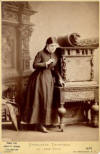 Charlotte
Thompson as Jane Eyrehttps://digitalcollections.nypl.org/items/9c56eec5-b99f-fe83-e040-e00a18063335
Charlotte
Thompson as Jane Eyrehttps://digitalcollections.nypl.org/items/9c56eec5-b99f-fe83-e040-e00a18063335
playbill Jane Eyre St Louis Olympic
Charles Pope as
Rochesterhttps://repository.duke.edu/dc/broadsides/bdsmo11142
1873 Sept John McCullough
1832-1885 https://en.wikipedia.org/wiki/John_Edward_McCullough Along
with Edwin Forrest and Edwin Booth, he was one of 19th century America's
greatest and most celebrated Shakespearean tragic actors. Tall and classically
handsome, with a stentorian Shakespearean voice, he excelled as Shakespeare's
Othello, King Lear, Coriolanus and Antony, and Richard III. His most celebrated
role was of Sheridan Knowles Virginius. Find a gravehttps://www.findagrave.com/memorial/6212308 Became insane and died of
paresis [syphilis].
1873 Oct-Nov Mrs. DP Bowershttps://en.wikipedia.org/wiki/Elizabeth_Crocker_Bowers
1830-1895 She
was playing in Broken
Seal when
she served on an Actors
Fund Fair committee
with EJ Phillips in 1892. She was
Emilia in the 1886 Booth Salvini Othello, the Queen in their Hamlet and the
Duchess of Berwick in the first American Lady Windermere's Fan in 1893. Bordman,
Oxford Companion
1873
Nov-Dec Adelaide Nielson in Romeo and
Juliet https://en.wikipedia.org/wiki/Adelaide_Neilson
1847-1880 She made her
first American appearance on 18 November 1872, at Booth's Theatre, New York
City, as Juliet. She not only achieved distinction
on the American stage, but accumulated a
considerable fortune.
1873 Dec EdwardA Sothern 1826-1881 https://en.wikipedia.org/wiki/Edward_Askew_Sothern As a result of his success in Camille, Sothern was given a part in Tom Taylor's Our American Cousin at Laura Keene's Theatre. This piece would later become famous as the play that Abraham Lincoln was watching when he was assassinated. Sothern's role was Lord Dundreary, a caricature of a brainless English nobleman. At first, he was reluctant to accept the role; it was so small and unimportant that he felt it beneath him and feared it might damage his reputation.[7][8] He mentioned his qualms to his friend, Joseph Jefferson, who had been cast in the leading role of Asa Trenchard in the play. Jefferson supposedly responded with the famous line: "There are no small parts, only small actors."[9]
Father of actor EH Sothern, who married Julia Marlowe.
1873 Dec Lydia Thompson 1838-1908 https://en.wikipedia.org/wiki/Lydia_Thompson She introduced Victorian burlesque to America with her troupe the "British Blondes", in 1868, to great acclaim and notoriety. She appeared at George Wood’s Museum in New York in 1868… The six-month tour turned into an extremely successful tour of almost six years, and during two subsequent tours, the Blondes drew huge crowds at leading theatres across the US. It also drew fierce criticism from those who felt it transgressed the boundaries of propriety. Burlesques, colloquially referred to as leg-shows, started off very tame, clever, and sophisticated, drawing in all types of people, especially women. Unfortunately, “the female audiences for burlesque did not last for long. In the summer of 1869 a wave of ‘anti-burlesque hysteria’ in the New York press frightened away the middle-class audiences that had initially been drawn to Ixion and sent the Thompson troupe prematurely packing for a national tour.
1873 Dec- 1874 Jan Carlotta LeClercq 1838=1893 https://en.wikipedia.org/wiki/Carlotta_Leclercq https://en.wikisource.org/wiki/LeClercq,_Carlotta_(DNB01)
1873 Jan Jane Coombs (1842-1901?) an American actress who made a sensational debut during the 1855-1856 theatre season. She starred opposite Edwin Forrest at New York’s Broadway Theatre. https://cabinetcardgallery.wordpress.com/tag/jane-coombs/ Sarony photo
During the 1870s, Coombs may have been the most highly esteemed tragedienne regularly appearing on the American stage...While her preeminence was challenged by Mary Anderson in the 1880s, Coombs enjoyed the highest approbation when performing the roles of the standard repertory from Shakespeare to Sheridan as her troupe toured the continent well into the 1890s.https://broadway.cas.sc.edu/content/jane-coombs
1874 Feb Maggie Mitchell had performed with John Nickinson. Clara Morris became a Union Square colleague of EJ Phillips.
1874 March Ada Gray (1834-1902) At one time leading lady for DeBar in St. Louis, and for a short time leading lady for John Wilkes Booth. John Wilkes Booth and the Women Who Loved Him 2018https://books.google.com/books?id=S342DwAAQBAJ&dq=%22ada+gray%22+theatre&source=gbs_navlinks_s

Strang's Players and Plays of the Last Quarter Century, Ben DeBar
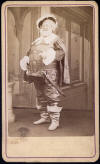
Ben DeBar as Falstaff
[EJ
Phillips, from one of her obituaries] went from there [St. Louis] to New Orleans to play old lady parts at the Varieties Theatre, the
leading stock theatre at New Orleans, under the management of Lawrence
Barrett. (1838-1891).
Cincinnati, New Orleans & St. Louis
During the decades of the 1850's and the 1860's the fact is
conspicuous that the Missouri river and water communication influenced, if they
did not actually dominate, not only the orientation of theatre and other
entertainment, but most aspects of the outlook and activities of the inhabitants
of the Missouri valley. Until well along in the 1860's most travel necessary to
entertainment was dependent upon the river almost as literally as showboats.
Whatever the theatrical organization and practices in the East and its large
cities, in order to provide continuity and variety along the Missouri river, the
resident dramatic company associated with the star system was almost a
necessity. Such a combination required the least possible dependence upon
mobility, especially during the winter months when the river was closed to
navigation. Incidentally, theatre was peculiarly a summer institution outside of
the largest cities. The orientation upon New Orleans by way of Cincinnati or by
way of St. Louis was based upon long practice interwoven with the multitude of
familiar connections and personal relations attendant upon a going concern. ...
A study of the New Orleans Theatre of the 1850's and 1860's, both before and
after the American Civil War, reveals the major role of that city in relation to
the interior river cities, extending to the Missouri river elbow region
including Leavenworth. Ben DeBar (1812-1878) came to the United States and New
Orleans by way of New York in 1835. Between that date and 1853 when he took over
the management of the St. Charles Theatre in New Orleans he had been in both New
York and New Orleans. In 1855 he bought a theatre in St. Louis to which he gave
his own name. Except for the Civil War period, when the St. Charles was closed,
he kept both going, adding in 1873 the Wakefield Opera House to his holdings in
St. Louis. ...
Even
prior to the Civil War the railroads were changing all this, but slowly, because
of the momentum of the "going concern," and the reluctance to abandon old and
accustomed connections for new and uncertain methods and personalities. Ben
DeBar and his enterprises in both St. Louis and New Orleans, continuing after
the war as before, were telling examples of persistence of old associations long
after railroads had superceded the water navigation which had originally made
the cities and his theatrical enterprises in the Mississippi valley possible. Theater in Kansas 1858-1868, James C. Malin, Kansas Historical Quarterly, Summer
1957 http://www.kshs.org/publicat/khq/1957/57_2_malin.htm New Orleans March 1897
Lawrence Barrett (1838-1891) In 1873 she "began a three years engagement under the management of Lawrence Barrett
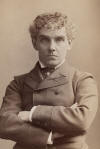 Harvard Theatre collection TCS 3.1357
Harvard Theatre collection TCS 3.1357 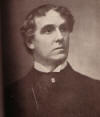 Strang's Players and Plays, 1902
Strang's Players and Plays, 1902
Barrett was "a careful, a painstaking, and a very dependable actor...He was
always a student and he never left anything to chance" according to theatre
critic William Winter.
Barrett had interrupted his acting career to enlist in a Massachusetts Regiment
during the Civil War, and after it ended he acted with Edwin Boothin New York, went to Philadelphia, to management in New Orleans and to San
Francisco. His best known Shakespearean part became Cassius, and he "did his
best to enlarge the restricted scope of the American theatre by the production
of new works". Dictionary of American Biography
In 1858 he was in the repertory company at the Boston
Museum.
He served in the American
Civil War as
captain in Company B of the 28th
Massachusetts Infantry regiment. However, he did not
see action in any major battles. From 1867 to 1870, with John
McCullough,
he managed the California
theatre, San
Francisco. Wikipediahttp://en.wikipedia.org/wiki/Lawrence_Barrett accessed March 17, 2015
Philadelphia
She next appeared at the Chestnut
Street Theatre in Philadelphia, which was then controlled by FF Mackay.
John Dolman Sr. was at the Arch Street Theatre from 1853-1860, when he left acting to become a lawyer, since his wife's family didn't want her to marry an actor.
Charlotte Cushman, Philadelphia, May 1858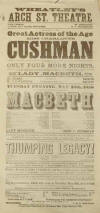
Headlined Great Actress of the Age Miss Charlotte Cushman,
Only Four More Nights as Lady MacBeth and Mr. Dolman playing MacBeth.
EJ Phillips' Philadelphia Before closing my Season with [Barrett] I made an engagement for Septr 1875 for the Chestnut Street Theatre Phila. where I appeared as “Clarissa” in “Our Boys” which was revived in the Spring of ’76 and ran through the entire “Centennial” Summer and beginning of the regular Season Septr 1876. During my vacation in the Summer of ’77 Mr. A.M. Palmer sent for me to play Mrs. Tubbs in “Pink Dominos” which he was to produce in August. I accepted his offer and made my first appearance in the Union Square theatre in August 1877 in the above part.
Being still under engagement to [William D] Gemmill [(c. 1845- 1882] and [J Frederick] Scott of the Chestnut Street Theatre Phila. for the Fall Season. I could not remain with Mr. Palmer to travel with Pink Dominos and returned to Philadelphia to open our season. Our season was closing at the end of May 1878 I again made an engagement with Mr. Palmer to join his company then playing in Chicago, Ill. opening in the Duchess in “A Celebrated Case”. At the end of the Summer season I returned to New York and was then made a member of the Stock Company of the “Union Square Theatre” remaining there until May 1885.
Frank Findley Mackay was manager of the Chestnut Street Theatre from 1875-78, along with William Gemmill (c. 1845- 1882) and J. Frederick Scott. However in 1878 severe internal difficulties began and the Company's previously favorable position (as Philadelphia's only first-class resident company) began to erode. Many of the company's best actors resigned. http://www.performingartsarchive.com/Theatres/Theatres-C/Chestnut-Street-Opera-House_Philadelphia/Chestnut-Street-Opera-House_Philadelphia.htm
Frank Findley Mackay (1832-1923) Wikipedia https://en.wikipedia.org/wiki/Frank_Findley_Mackay
photo in the Two Orphans 1875http://digitalcollections.lib.washington.edu/cdm/ref/collection/19thcenturyactors/id/464
EJ Phillips Philadelphia photograph 
 Centennial
Exposition opening day
Centennial
Exposition opening day
FF Mackay in the Two Orphans , Univ. of Washington Libraries Digital Collectionhttp://digitalcollections.lib.washington.edu/cdm/ref/collection/19thcenturyactors/id/464
The [New] Chestnut Street Theatre was built in 1862 on the north side of Chestnut Street between Twelfth and Thirteenth Streets, a full seven blocks to the west of the old theatre, and considered by many too far removed from the theatre district to succeed. But "the rapid westward expansion of center-city Philadelphia soon made the new Chestnut Street Theatre the city's most fashionably located theatrical facility." http://www.performingartsarchive.com/Theatres/Theatres-C/Chestnut-Street-Opera-House_Philadelphia/Chestnut-Street-Opera-House_Philadelphia.htm
Philadelphia May 5, 1895 On Monday the 13th I appear at the Girard Theatre for one week as the "Marquise de St Maur" in Caste. It is 19 years [1876] since I played it at the Chestnut [Street Theatre, Philadelphia].
"Our Boys" at the Chestnut [Street Theatre] ran the whole Centennial summer[June 26-November 18, 1876]. A program lists Mrs. EJ Phillips as Miss Champneys, an elderly young lady. The cast included McKee Rankinas Charles Middlewick.
Our Boys 100th Performance Sept. 6, 1876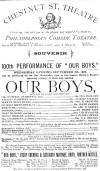
Following the end of the American Civil War, Americans began to prepare for the celebration of the nation's 100th birthday in 1876. Various citizens of Philadelphia proposed that this exhibition should be held in this city and a resolution to that effect was adopted by the Select and Common Councils in January 1870. The International Exhibition opened to the public on 10 May 1876 and closed on 10 November 1876.http://www.phila.gov/phils/Docs/Inventor/graphics/agencies/A230.htm
Centennial Exhibition 1876, Free Library of Philadelphia http://libwww.freelibrary.org/cencol/
The Chestnut Street Theatre Stock Company disbanded in 1880 and the theatre was demolished in 1917. Durham1986
The Players Club of Swarthmore [Pennsylvania] produced The Rivals in Feb. 1934, with John Dolman Jr. playing Sir Anthony Absolute, and Hattie(Mrs. John Dolman Senior) lending Mrs. Malaprop the costume worn by EJP at the Chestnut Street Theatre in November 1877. The Players Club has (or had) a program from that production displayed in the lobby. The program notes that "the frank artificiality of these plays is a bit startling to modern audiences not accustomed to them They were written for large bare stages with painted wings and drops and little furniture; and were played in "The grand manner," with the actors facing the audience most of the time and declaiming their lines bombastically. Asides and soliloquies were spoken directly to the audience; the actor did not drop out of character, but the character stepped out of the play to confide in the audience with the utmost frankness. We shall try to recapture that pleasantly childish convention.
"We have discovered many apocryphal lines and traditional bits of business not conceived by Sheridan, but have retained a few of the happiest, including Mrs. Malaprop's mistake in handing Captain Absolute the wrong letter (supposed to have been invented by Mrs. John Drew), the chore boy's line about kicking the cat, Bob Acres' curl papers, his last two lines in the challenge scene (probably invented by Jefferson), and much of the comic business between Sir. Lucius and Acres in the last scene of the play. "
The Arch Street Theatre opened in 1828 as a rival to the Chestnut and Walnut Street Theatres in Philadelphia. The theatre's heyday began in 1861 when Mrs. John [Louisa Lane] Drew (1820-1897) established it as one of the greatest of American stock companies. The house was under her control for the next 31 years. "She was not the first woman in America to manage a theatre and direct an acting company, but she was the first to do so on a considerable scale, and over a term of years...When she finally retired from the management she became the grande dame of the American Theatre." In her last years she was said to cheerfully travel 1000 miles for a chance to play Mrs. Malaprop. Dictionary of American Biography
next: Union Square Theatre Co.
Cleveland Then go to St Louis. Play in the old Olympic where I used to belong to the Stock Co [with Benedict DeBar].Nov 23, 1893Cincinnati
On the 4th St Louis. We play at the Olympic Theatre there and I shall stop at Southern hotel which is just opposite theatre.1894
The Southern Hotel had opened in 1865.
The Southern
Absolutely Fireproof
St Louis
Octr 16th 1894
My dear Neppie,
You will be surprised to receive this from so far a distance, unless Hattie has written to you since I left. I had received a telegram from Gustave Frohman on Friday asking me if I could play the "Duchess" in [Lady] Windermere's Fan for this week in St Louis. I answered yes, and on Saturday Morning about 9 rec'd another telegram from him telling me to start by Penn RR.
I got ready in a hurry, took the 4:30 train and arrived here at 7 on Sunday night. Played last night and expect to through the week -- eight performances in all. The Co then go to Columbus, O[hio] for three nights, then back to Indianapolis for three nights. And after that go South, playing in New Orleans on Xmas.
Walter Dolman is looking splendidly. There has been some trouble in the Co with the Duchess and her husband who played Lord Darlington and they were dismissed, So I was sent for, for this week. I had nothing to do and thought I might as well come. I shall not be much richer for it, but it was a nice little trip.
I am not as strong as I would like to be, but if in an engagement I think I should feel better. God bless you all! is the constant wish of your loving Mother
next: Philadelphia Oct. 31,1894 [She ended up in Toronto in December instead.] New Orleans March 1897
Bibliography
Blum, Daniel C., Pictorial History of the American Theatre 1860-1980,New York:
Crown Publishers, Fifth edition, 1981.
Bordman, Gerald, American Theatre: A Chronicle of Comedy and Drama 1869-1914,
New York: Oxford University Press, 1994.
Bordman, Gerald Martin, Oxford Companion to the American Theatre, New York :
Oxford University Press, Second edition, 1992.
Brown, T. Allston, History of the American Stage, New York : Dick & Fitzgerald,
1870. HAS
Durham, Walter B. American Theatre Companies 1749-1887, Westport CT : Greenwood
Press, 1986.
Hewitt, Barnard, History of the Theatre from 1800 to the Present Day, New York
: Random House, 1970.
Hoosier’s State Chronicles: Indiana’s
Historic Digital Newspaper Program https://newspapers.library.in.gov/
Hornblow, Arthur, A History of the Theatre in America, New York/London: Benjamin
Blom, 1919.
Hughes, Glenn, A History of the American Theatre 1700-1950, New York: Samuel
French, 1951.
King, Edward and James Wells Champneys, The Great South, Hartford: American
Publishing Co., 1875 http://docsouth.unc.edu/nc/king/menu.html
Leach, Joseph, Bright Particular Star: The Life and Times of Charlotte Cushman,
1970
Leslie, Frank, Frank Leslie" Illustrated Historical Register of the Centennial
Exposition 1876: A Facsimile of with a new introduction by Richard Kimer,
Paddington Press Ltd, 1976
Quinn, Arthur Hobson, A History of the American Drama: From the Civil War to
the Present Day, New York : Appleton-Century Crofts, 1927.
Strang, Lewis C., Players and Plays of the Last Quarter Century, Boston : L. C.
Page & Co., 1902.
Stratman, Carl J., American Theatrical Periodicals 1798-1967: A bibliographical
guide, Durham : Duke University Press, 1970.
Taubman, Howard, The Making of the American Theatre, New York : Coward McCann
Inc., 1965.Wilmeth, Don B. and Tice L. Miller, Cambridge Guide to American
Theatre, Cambridge Cambridge University Press, 1993.
Zecher, Henry William Gillette, America's Sherlock Holmes Xlibris, 2011 http://books.google.com/books?id=ScXhXVaAFlAC&vq=debar&dq=ben+debar's+stock+company+st+louis&source=gbs_navlinks_s
William Gillette worked for Ben DeBar in St, Louis as a young man.
St. Louis Post Dispatch 1874-1922 https://stltoday.newspapers.com/
Harvard Theatre Collection has some of Lawrence Barrett's Letters 1863- 1891 https://hollisarchives.lib.harvard.edu/repositories/24/resources/1927
William Seymour Family papers at Princeton have Lawrence Barrett tour, expense and receipt book 1873-1874.https://findingaids.princeton.edu/collections/TC011/c688
Philadelphia Free Library (Logan Square) has a Philadelphia Theatre Collection with a Chestnut Street Theatre File, Chestnut Street Theatre Programs File and Philadelphia Theatre Index, as well as files on many of the Chestnut Street Theatre performers.
Last updated August 20, 2021
| 1867 | 9 | 2 | 1 wk | Indianapolis IN | Metropolitan Theatre | EJP in Indianapolis | to 1868 ? | |
| 1868 | 3 | ? | Indianapolis IN | Edwin Forrest EJP first played with | ||||
| 1868 | 3 | ? | Indianapolis IN | Metropolitan Theatre | King Lear | EJP Goneril with Edwin Forrest | ||
| 1868 | 3 | ? | Indianapolis IN | Metropolitan Theatre | Virginius | EJP Servia with, Edwin Forrest | ||
| 1868 | 3 | ? | Indianapolis IN | Metropolitan Theatre | Virginius Othello EJP plays with Edwin Forrest | |||
| 1868 | 8 | 8 | Indianapolis IN | New Acad of Music | WH Leake secured EJP first old woman | |||
| 1870 | 9 | 3 | to Jun 30 | Indianapolis IN | Children arrived Indianapolis | |||
| 1870 | 11 | 28 | to Dec 7 | Indianapolis IN | Board paid for children in Indianapolis | |||
| 1871 | 8 | to sep 3 | Indianapolis IN | Board paid for children in Indianapolis | ||||
| 1872 | 2 | 29 | to Mar 11 | Indianapolis IN | Board paid for children in Indianapolis | |||
| 1872 | 10 | 4 | 1 week | Indianapolis IN | left New York for Indianapolis | |||
| 1872 | 10 | 6 | to Oct 11 | Indianapolis IN | Board paid for children in Indianapolis | |||
| 1873 | 7 | 17 | Indianapolis IN | Board paid for children in Indianapolis | ||||
| 1873 | 8 | 3 | Indianapolis IN | balance due Mrs Fay for children | ||||
| 1873 | 11 | 11 | Indianapolis IN | Money to Mrs Fay for children's board | ||||
| 1873 | 11 | 13 | Indianapolis IN | balance settled Mrs Fay for children | ||||
| 1873 | 12 | 16 | to Dec 30 | Indianapolis in | Money to Mrs Fay for children's board | |||
| 1874 | 3 | 9 | to Apr 1 | Indianapolis IN | Money to Mrs Fay for children's board | |||
| 1874 | 3 | 24 | to Sep | Indianapolis IN | balance Settled Mrs Fay Oct 4 | |||
| 1874 | 5 | 18 | to Jun 4 | Indianapolis IN | Money to Mrs Fay for children's board | |||
| 1874 | 9 | 26 | Indianapolis IN | travel expenses EJP board and meals | ||||
| 1874 | 11 | 13 | Indianapolis IN | Cash to Madame Zavistowski for children | ||||
| 1874 | 11 | 13 | 2 weeks | Indianapolis IN | travel expenses EJP board and meals | |||
| 1874 | 12 | 8 | Indianapolis IN | Cash to Madame Zavistowski for children | ||||
| 1874 | 12 | 8 | 11 days | Indianapolis IN | travel expenses EJP board and meals | |||
| 1893 | 1 | 29 | 3 nights | Indianapolis IN | Grand Opera | Joseph | to Springfield OH Terre Haute Lexington KY | |
| 1894 | 11 | 28 | 3 nights | Indianapolis IN | did they end up going? | |||
| 1895 | 2 | 25 | 3 nights | Indianapolis IN | Camille | Madame Prudence | ||
| 1868 | 5 | 23 | New Orleans la | traveling commenced | Varieties Theatre New Orleans for WR Floyd? | |||||
| 1869 | 9 | 25 | to 1870 | New Orleans LA | Varieties Theatre | WR Floyd engaged EJP | ||||
| 1871 | 10 | 2 | New Orleans LA | Board paid for children in Indianapolis | ||||||
| 1871 | 10 | 7 | to ? | New Orleans LA | Olympic Theatre | Pope's Olympic touring included Memphis Mobile Shakespeare mainly? | ||||
| 1871 | 12 | 4 | to Dec 18 | New Orleans LA | Board paid for children in Indianapolis | |||||
| 1872 | 3 | 11 | to Apr 23 | New Orleans LA | Board paid for children in Indianapolis | |||||
| 1872 | 6 | 16 | to ? | New Orleans LA | Left St Louis for New Orleans | |||||
| 1872 | 11 | 9 | to Jan 15 | New Orleans LA | Board paid for children in Indianapolis | |||||
| 1872 | 11 | 14 | New Orleans LA | travel expenses | ||||||
| 1872 | 11 | 18 | New Orleans LA | commenced in play illegible [moise?] and wife | ||||||
| 1873 | 3 | 19 | New Orleans LA | Board paid for children in Indianapolis | ||||||
| 1873 | 4 | 1 | ?to April 20 | New Orleans LA | Commenced traveling season with Mr Barrett leaving New Orleans for Mobile | |||||
| 1897 | 3 | 2 | to mar 6 | New Orleans LA | Acad Music | Gay Parisians | Season closed Mar 6 by order Chas Frohman | |||
| 1871 | 9 | 1 | to Oct early | St Louis MO | Olympic Theatre | EJP engaged by Charles Pope's Olympic Theatre toured Memphis, New Orleans and Mobile | ||
| 1871 | 9 | 8 | to sept 18 | St Louis MO | Board paid for children in Indianapolis | |||
| 1871 | 9 | 11 | St Louis MO | sent Mrs Fay money order being amount of money I received on leaving Indianapolis | ||||
| 1871 | 9 | St Louis MO | Olympic Theatre | Money by Bulwer Lytton | ||||
| 1871 | 10 | 28 | St Louis MO | Olympic Theatre | Charles Pope's Olympic touring | |||
| 1871 | 10 | 30 | to Nov 9 | St Louis MO | Board paid for children in Indianapolis | |||
| 1872 | 1 | 29 | to Feb 24 | St Louis MO | Board paid for children in Indianapolis | |||
| 1872 | 4 | 23 | to May 27? | St Louis MO | Board paid for children in Indianapolis | |||
| 1872 | 9 | 1 | St Louis MO | Olympic Theatre | Pope's Olympic end of 2nd year | |||
| 1872 | 9 | 3 | St Louis MO | Olympic Theatre | Pope's Olympic 3rd year commenced | |||
| 1873 | 8 | to Sept | St Louis MO | board in St Louis | ||||
| 1873 | 11 | 17 | 1 month | St Louis MO | Rent for room | 113 N 8th St | ||
| 1873 | 11 | 24 | to Dec 16 | St Louis MO | Money to Mrs Fay for children's board | |||
| 1873 | 12 | 31 | to Feb 17 | St Louis MO | Money to Mrs Fay for children's board | |||
| 1874 | 3 | 20 | St Louis MO | play with Charles Pope | ||||
| 1874 | 11 | 7 | 1 week | St Louis MO | travel expenses EJP board and meals | |||
| 1881 | 4 | 4 | St Louis MO | play with Maud Harrison, Sara Jewett, John Parselle | ||||
| 1887 | 5 | 25 | St Louis MO | play with Walden Ramsey Linda Dietz? | ||||
| 1893 | 12 | 4 | 1 wk | St Louis MO | Olympic Theatre | Lady Windermere's Fan | to South Bend Grand Rapids Binghamton | |
| 1894 | 10 | 16 | 1 wk | St Louis MO | Olga Nethersole | to Columbus OH Indianapolis 3 nights | ||
| 1895 | 2 | 18 | 1 week | St Louis MO | Grand Opera House | Camille Romeo & Juliet Transgressor | ||
| 1895 | 9 | 11 | St Louis MO | William Palmer, brother of AM Palmer commit suicide | ||||
| 1896 | 10 | 5 | 1 week | St Louis MO | Century | Gay Parisians | 10 performance | then Decatur IL |
Homepage A to Z Index Bibliography People Places Plays Site
Map About
these letters About EJ
Phillips EJ
Phillips Facebook Fan Page